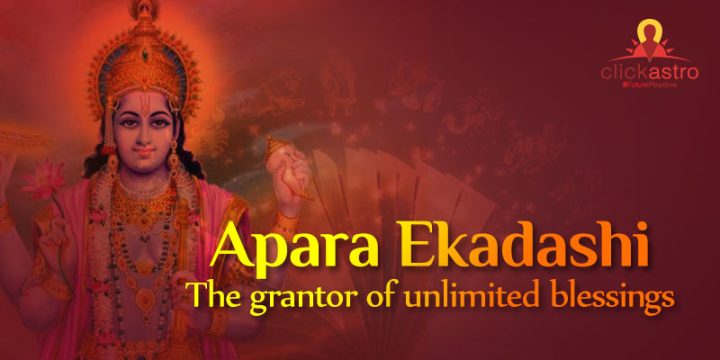Contents[hide]
Apara Ekadashi
Lord Vishnu is one of Hinduism’s most important deities, revered as the Creator and the Omnipresent. The Ekadashi fast, one of the major fasts in Hindu culture, is intended to worship Lord Vishnu in all of His manifestations. According to Hinduism, following the Ekadashi fast absolves one of all sins and allows one to enter Lord Vishnu’s abode known as Vaikunta. The 11th (Ekadashi) day of the Krishna Paksha (waning moon) in the month of Jyeshta, which corresponds to May – June in the Gregorian calendar, is observed as Apara Ekadashi. Devotees who fast on Apara Ekadashi receive an abundance of blessings and are forgiven of their past and present misdeeds. This Ekadashi is also known as the Ajala Ekadashi, and people who worship Lord Vishnu and Goddess Lakshmi on this day receive glorious and auspicious results.When is Apara Ekadashi 2024?
Apara Ekadashi will be celebrated on Sunday, June 2, 2024.Below are the Muhurta timings
| Sunrise | 6/2/2024 5:44 |
| Sunset | June 02, 2024, 7:05 PM |
| Ekadashi Tithi commences | 6/2/2024 5:05 |
| Ekadashi Tithi concludes | 6/3/2024 2:41 |
| Hari Vasara End Timing | 6/3/2024 8:06 |
| Dwadashi concludes | 6/4/2024 0:18 |
| Parana Timings | June 03, 8:06 AM – June 03, 8:24 AM |
Apara Ekadashi dates from 2022 to 2026
| 2022 | Thursday | May 26 |
| 2023 | Monday | May 15 |
| 2024 | Sunday | June 2 |
| 2025 | Friday | May 23 |
| 2026 | Wednesday | May 13 |
Apara Ekadashi Puja Vidhi and Rituals
The devotees who observe the Apara Ekadashi fast begin their fast from Dashami (10thday), as they do with all other Ekadashi fasts. The ceremonies must be performed with total devotion and dedication. In preparation for the Ekadashi fast, worshippers follow a partial fast on Dashami day. This is to ensure that during the Ekadashi fast, the stomach remains empty and without any food during the entire fast.
Read about Devutthana Ekadashi
On Ekadashi day, one should rise before daybreak and after taking a bath, arrange and adorn the puja chamber for the puja rites. Following the decoration of Lord Vishnu’s statue with a garland of Tulsi leaves, sandalwood paste, incense sticks, and flowers, worshippers take a Sankalp (vow) to observe the fast with utmost devotion and pray for the fast’s successful completion and blessings from the Lord. Sweets are prepared for the Lord to be offered as Naivedhya. The devotees recite Lord Vishnu’s hymns and mantras, as well as the Apara Ekadashi Vrat Katha. After that, aarti is done, and sweets are distributed to the worshippers. On this day, devotees can fast completely or partially. A partial fast requires abstaining from rice, grains, onion, garlic, and other foods, except for fruits and milk. On Apara Ekadashi, devotees who observe a strict fast abstain from eating or drinking anything. As a result, this fast is also known as Ajala Ekadashi. The fast starts with the sunrise on Ekadashi and ends with the sunrise on Dwadashi (12th day). Devotees do a Jagran by staying awake all night on Ekadashi to worship Lord Vishnu by chanting hymns and mantras like Vishnu Chalisa and Vishnu Sahasranama. On Dwadashi day, devotees conduct puja and aarti to Lord Vishnu after taking a bath before sunrise. Offering money to Brahmans, the destitute, and the needy, as well as feeding the cows, concludes the fast rites. The fast is broken with a glass of water and fruits by the worshippers. Lord Vishnu’s Ekadashi fasts must be followed with complete devotion and piety. While observing the fast, it is essential to clear the mind of all bad thoughts and to maintain a righteous path in life without lying or speaking ill of people. This will ensure that those who observe the fast as per the rituals receive many blessings and are cleansed of their sins.






